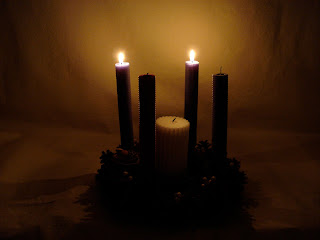Ever since I read this interesting post from a fellow hymn-blogger last week, I have been pondering the whole subject of sentimentality in carols. There is no doubt in my mind that the Christmas season is one which stirs up a great variety of feelings in all of us - and for many different reasons. Some feelings have positive connections, some negative.
On Sunday, Dec. 20th we sang as our closing hymn Long ago, prophets knew (words by Fred Pratt Green). The last line of the final verse is: "unborn son of Mary, Saviour do not tarry!" Tears welled up in my eyes as I played. It seems with each year that passes, my prayer grows in intensity that Christ will come again. So - is this sentiment or emotion? Or something else altogether?
Definitions from the Oxford dictionary: emotion - a strong mental or instinctive feeling such as love or fear; sentiment - [I'm abbreviating here] a mental feeling; tendency to be swayed by feeling rather than by reason.
Merriam-Webster is less wordy: emotion - a usually intense feeling; sentiment - thought and judgment influenced by feeling.
Now really, I'm not sure these definitions make things any clearer. And maybe I'm just trying to justify my own feelings! What do you think? Is there a difference between being emotional about a certain carol and being sentimental? Are these differences simply one of implication?
Here you will find thoughts on hymns, the church year, church music in general, in other words, notes of faith.
Wednesday, December 30, 2009
Friday, December 25, 2009
Merry Christmas!
Monday, December 21, 2009
Prepare the Way - Advent 4

I can think of no better day to post about the Light of the world, our Saviour, Jesus Christ, than on the shortest day of the year. Take heart, my friend, we have almost come to the end of our waiting for the celebration of His coming! Today, in Winnipeg where I live, the sun rose at 8:24 a.m. and set at 4:29 p.m. I am quite happy to know that the days will now get longer again.
It is common to reserve the image of light in carols to those used around Epiphany. For example, We Three Kings - "guide us to Thy perfect light." Or, Break forth, O beauteous heavenly light. However, we also have Silent Night - "Son of God, love's pure light" and O come, all ye faithful - "God of God, Light of light, born unto Mary, the virgin blest". Let us rejoice, not just on the day with the least amount of daylight, but every day of the year that we can trust the Light of all lights to guide us on our way!
Monday, December 14, 2009
Prepare the Way - Advent 3

I recently (Dec. 6th) presented a solo concert of Advent and Christmas music. Basically, I have two goals in preparing for such a concert. First - to give information about the music or words to make them more meaningful to the audience; second - to introduce lesser known works to expand musical horizons. My favourite new-to-me Christmas song is the Wexford Carol. I included it in the program as part of the second goal. I discovered it in a book of arrangements by Phillip Keveren called, appropriately enough, Celtic Christmas. Here is a most wonderful version I found on YouTube.
Wednesday, December 9, 2009
Prepare the Way - Advent 2

Of the Father's Love Begotten
Of the Father's love begotten
Ere the worlds began to be,
He is Alpha and Omega
He the Source, the Ending He
Of the things that are, that have been,
And that future years shall see,
Evermore and evermore.
O ye heights of heaven, adore Him!
Angel-hosts, His praises sing!
Powers, dominions, bow before Him,
And extol your God and King!
Let no tongue on earth be silent,
Every voice in concert ring.
Evermore and evermore.
Words by Aurelius Clemens Prudentius
- based on the Latin hymn Corde Natus ex Parentis
Music derived from 13th Century Plainsong
The Latin hymn on which these words are based was written in the early Fifth Century by Aurelius Clemens Prudentius whose professions include being a lawyer, head bodyguard to a Roman Emperor and, later in life, a monk. These are only 2 of 10 English verses translated first by John Mason Neale and later revised by Henry W. Baker, both in the 1800's. The 13th Century plainsong melody is hauntingly beautiful and creates just the right mystical atmosphere of awe as we try to put into words the divine mystery of Christ's coming to earth.
Subscribe to:
Posts (Atom)
